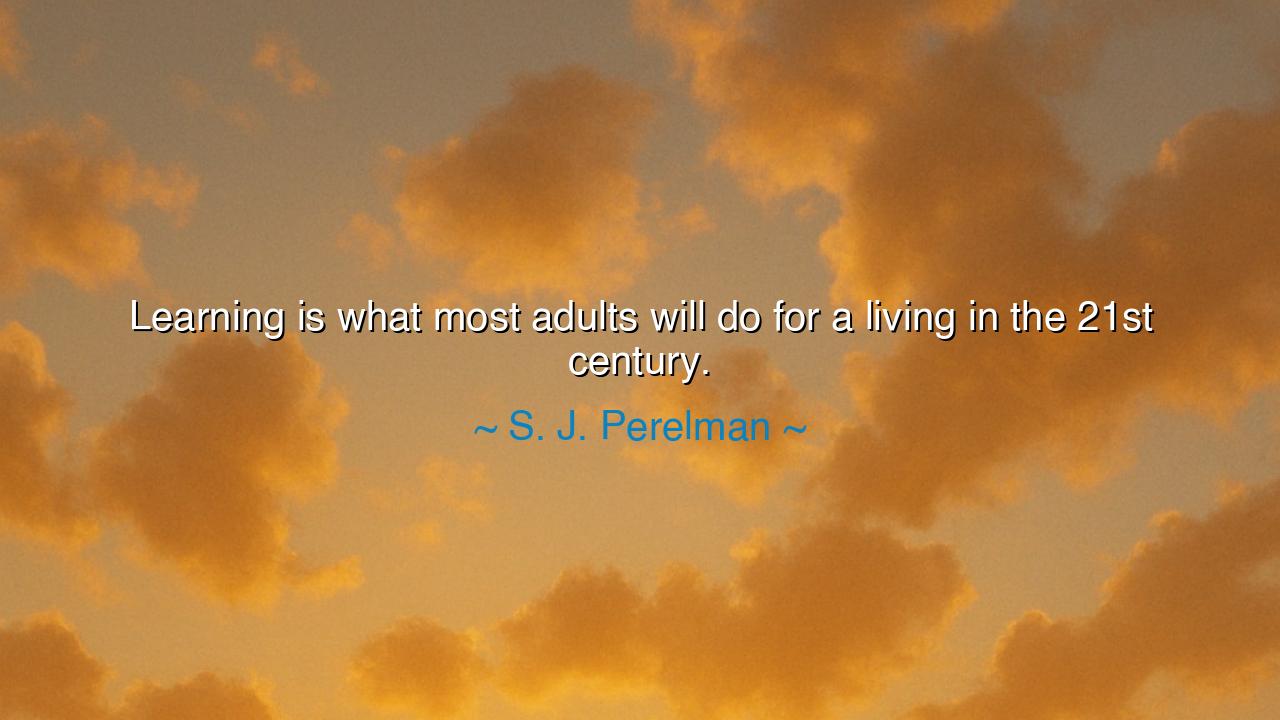
Learning is what most adults will do for a living in the 21st






When S. J. Perelman said, “Learning is what most adults will do for a living in the 21st century,” he was not only observing a shift in the nature of work, but proclaiming a prophecy about the destiny of humankind. His words, spoken with the wit of a satirist and the foresight of a sage, reveal a truth that grows clearer with each passing decade: that learning itself has become the great labor of our age. In earlier times, people learned to prepare for work; now, they must work to continue learning. The world changes too swiftly for fixed knowledge to endure. In this century, the mind must become the craft, and curiosity the trade by which one earns one’s place in the world.
The origin of this idea can be traced to the dawn of the modern era, when machines began to outpace muscle, and information began to outweigh material wealth. Perelman, who lived through the industrial and early technological revolutions, saw what many did not — that the future would not belong to those who merely possessed skills, but to those who could continually adapt. To survive and to thrive, humanity would have to become a species of lifelong learners, capable of discarding yesterday’s knowledge to embrace tomorrow’s truths. Thus, the meaning of labor would transform: it would no longer be about building things with our hands, but about rebuilding ourselves with our minds.
In the style of the ancients, we might say that Perelman foresaw the rebirth of the Scholar-Warrior — one who must fight ignorance as the ancients fought beasts, one whose weapon is the mind and whose armor is adaptability. In the centuries of stone and steel, the craftsman mastered his tool and repeated his task. But in the century of light and code, the tools evolve faster than the hands that wield them. The only mastery that endures is the mastery of learning itself. To live in the 21st century is to live in a perpetual apprenticeship — not to a trade, but to life itself.
This truth is illustrated powerfully in the story of Ada Lovelace, the daughter of the poet Lord Byron and the world’s first computer programmer. In her time, machines were physical engines powered by steam. Yet she learned to imagine engines of thought — mechanical minds that could weave patterns of logic as looms wove cloth. Her genius was not in knowing what was, but in learning what could be. Centuries before the digital revolution, she embodied Perelman’s wisdom: that in every era of transformation, those who learn fastest shape the future. Her curiosity became her livelihood, her learning her immortality.
But there is also in Perelman’s quote a moral and spiritual undercurrent — a call to humility. For if learning becomes our lifelong occupation, then no man or woman can claim to be complete. We are all, forever, students at the table of life. The ancient philosopher Socrates declared, “I know that I know nothing,” and in those words lies the secret of enduring wisdom. The 21st century demands this same humility — that we admit our ignorance not as shame, but as strength. For in a world where knowledge doubles by the moment, arrogance is blindness, and curiosity is vision.
Perelman’s insight also warns against a deeper danger — that we may mistake information for knowledge, and knowledge for wisdom. To “learn for a living” does not mean to collect facts as one might hoard coins. It means to grow, to question, to evolve in understanding and spirit. The true labor of learning is not memorization, but transformation. The worker of the future must not only learn new tools, but new ways of thinking, new ways of being — for the challenges of this age are not merely technological, but moral. The climate of the Earth, the fabric of truth, the bonds between nations — all depend on minds that can learn, unlearn, and learn again.
Thus, the lesson is clear: to live in this age is to be an eternal apprentice of change. Do not resist learning as a burden; embrace it as your birthright. Each day, seek to refine your understanding, to broaden your sight, to reforge your mind in the fires of curiosity. Read not only with your eyes, but with your heart. Listen to the young as well as the old. Challenge your own certainties. For in the 21st century, as Perelman foresaw, learning is not preparation for life — it is life itself.
So remember this truth, my friends: the wise do not grow weary of learning, for they understand that to learn is to live, and to stop learning is to die before death. Make of your days a lifelong school, of your mind a vessel ever filling, ever emptying, ever renewed. For those who learn without ceasing become the builders of every new world — and in their hands, the future itself becomes a craft, shaped not by what they know, but by how deeply they are willing to keep learning.






AAdministratorAdministrator
Welcome, honored guests. Please leave a comment, we will respond soon